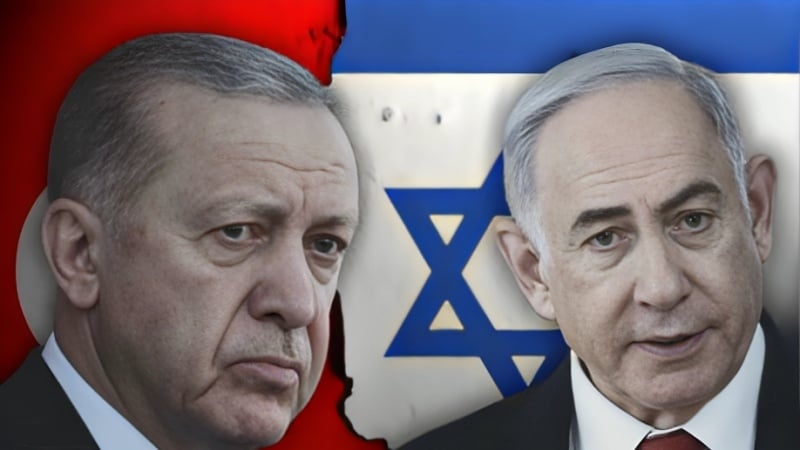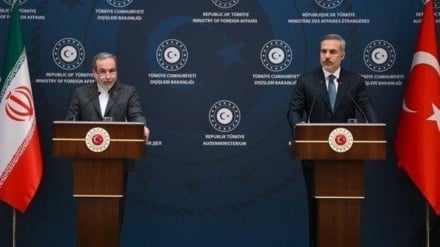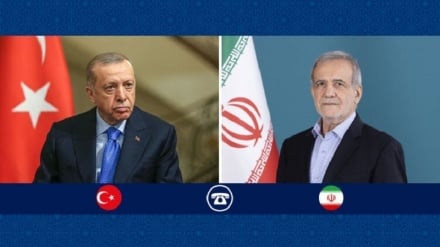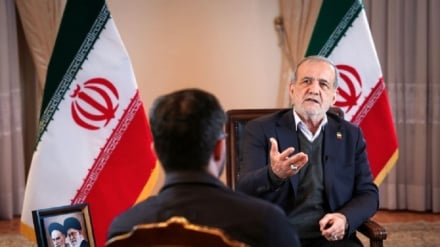Is there a possibility of war between Turkey and Zionist regime?
-

Right: Benjamin Netanyahu, the Zionist regime PM, Left: Recep Tayyip Erdoğan, Turkish President
Pars Today: The Zionist regime's attack on Qatar has intensified tensions between Turkey and Israel, raising the possibility of a direct confrontation between Ankara and Tel Aviv.
According to Pars Today, Zionist analysts claim that since the Al-Aqsa Storm operation on October 7, 2023, the Zionist regime has changed its national security doctrine to treat all potential threats as immediate threats rather than delaying responses. In the two years since October 7, Israel has demonstrated a pattern of aggressive behavior by carrying out numerous unprecedented attacks on neighboring countries.
Israel has now targeted six Middle Eastern countries—Palestine (Gaza), Lebanon, Syria, Yemen, Iran, and then Qatar—during the two-year Gaza war. In fact, the attack on Qatar has sounded the alarm for countries such as Turkey and Pakistan.
Verbal attacks between the leaders of the Zionist regime and Turkey have also increased. Benjamin Netanyahu, the Prime Minister of the Zionist regime in Beit al-Moqaddas, said: "We are here (Quds). This is our city. Mr. Erdoğan, this is not your city. It is our city. It will always be our city. It will never be divided again."
Recep Tayyip Erdoğan, President of Turkey, responded to Netanyahu's claim that the Quds would always be Israeli by stating: "We will never allow the holy city of Quds to be defiled by unworthy hands!" He emphasized that "ideologically, Netanyahu is like one of Hitler's relatives."
The recent attack on Doha, the capital of Qatar, indicates the expansion of Israel's aggression to new countries that had not been directly targeted before. This action, which is considered a clear violation of international law, has raised serious concerns in the region. By attacking Hamas leaders in Qatar, Israel sent a message to Turkey: Hamas's last refuge in Turkey could be the next target of attack.
According to many foreign policy analysts, Turkey's NATO membership does not provide protection against an Israeli attack. An Israeli attack could be considered self-defense against a state that supports terrorism, and a collective NATO response under Article 5 would not be automatic.
Analyses in Zionist publications, particularly Haaretz, indicate that Turkey may be Israel's next target due to its support for Hamas and its increased military presence in Syria. This possibility is reinforced by the growing rivalry between the two sides in Syria and their mutual hostile statements, including Netanyahu's recognition of the Armenian genocide.
As a NATO member, Turkey is preparing for Israeli threats by strengthening its military infrastructure, including defense systems and weapons production. Israel's recent attack on Turkish radar equipment in Syria, which resulted in the deaths of several Turkish soldiers, and Ankara's willingness to support local groups against Israel are clear signs of this confrontation.
Azerbaijan's mediation in April to prevent accidental clashes between Turkey and Israel was only a temporary solution and failed to address the root causes of tension. On the other hand, increased cooperation between Turkey and Qatar in Syria, especially after the fall of Bashar al-Assad, has heightened Israel's concerns.
From a military perspective, Israel has superiority with advanced technology, air power, and a nuclear arsenal. However, the Turkish military, as one of the largest forces in NATO, has the capability to pose serious challenges. Israel's efforts to prevent the sale of F-35 fighter jets to Turkey indicate Tel Aviv's concerns about Ankara's military strengthening.
Turkey has recently increased investment in its missile and air defense capabilities and unveiled new ballistic and cruise missile systems earlier this year. Erdoğan also inaugurated a $1.5 billion research center for the defense contractor ASELSAN, which develops radar, electronic warfare, and air defense systems under the brand name "Steel Dome."
These include the SİPER air defense system, capable of engaging targets at a range of 150 kilometers. Turkey's fleet of F-16 fighter jets, which form the backbone of its air force, is aging, and negotiations with the United States to rejoin the F-35 program have stalled. This has compelled Ankara to accelerate the development of indigenous platforms such as the fifth-generation "KAAN" fighter jet, scheduled for production in 2030, and the stealth "Kızılelma" unmanned jet.
Turkish analysts believe that any violation of Turkish airspace by Israel will prompt an immediate and severe response from Ankara. Despite repeated targeting and threats against Turkey and its officials by leaders of the Zionist regime, maritime trade between Turkey and Israel continues.
Despite economic and trade relations between Turkey and Israel, Benjamin Netanyahu, the adventurous Prime Minister of the Zionist regime, has no qualms about attacking Turkey under the pretext of targeting Hamas leaders and officials in the country. This is especially true given that Donald Trump has effectively given a green light to all of Tel Aviv's unprecedented actions against countries in the region.


